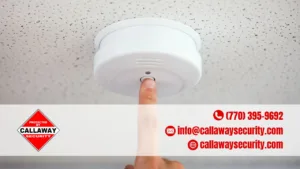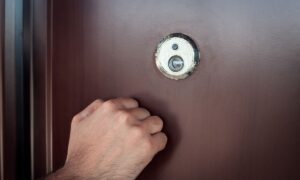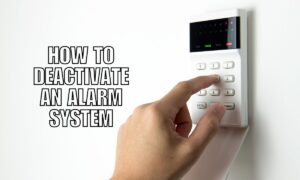Home security systems are designed to protect your home and belongings from burglaries and other intrusions. These systems consist of various components such as alarms, surveillance cameras, motion sensors, and door/window sensors that work together to detect and deter potential burglars. The primary goal of a home security system is to prevent break-ins and provide peace of mind for homeowners.
Burglary prevention is of utmost importance for homeowners. A burglary not only results in the loss of valuable possessions but also has a significant emotional impact on the victims. The sense of violation and fear that comes with a break-in can be long-lasting and affect the overall well-being of individuals and families. By investing in a home security system, homeowners can take proactive measures to protect their homes and prevent burglaries from occurring.
Key Takeaways
- Home security systems are essential for preventing burglaries and protecting your home and family.
- A home security system can deter burglars by providing visible signs of surveillance and alerting authorities in case of a break-in.
- There are different types of home security systems, including wired, wireless, and smart systems, each with unique features and benefits.
- Installing a home security system can provide peace of mind and potentially lower your homeowner’s insurance premiums.
- When choosing a home security system, consider factors such as cost, monitoring services, and compatibility with your home’s layout and needs.
Understanding the Importance of Home Security Systems
Statistics on home burglaries paint a grim picture of the prevalence of this crime. According to the Federal Bureau of Investigation (FBI), there were approximately 1.2 million burglaries reported in the United States in 2019 alone. This means that a burglary occurred every 25.7 seconds. These numbers highlight the need for effective burglary prevention measures, such as home security systems.
The emotional and financial impact of a burglary cannot be underestimated. Victims often experience feelings of fear, vulnerability, and violation after a break-in. They may struggle with anxiety and have difficulty feeling safe in their own homes. Additionally, the financial loss resulting from stolen items can be significant, not to mention the cost of repairing any damage caused during the break-in. By investing in a home security system, homeowners can protect themselves from these emotional and financial burdens.
How Home Security Systems Deter Burglars
Visible security measures play a crucial role in deterring potential burglars. When burglars see signs indicating that a home is protected by a security system, they are more likely to move on to an easier target. This is because they know that the risk of getting caught is higher when a home has visible security measures in place. Therefore, simply having a home security system can act as a deterrent and prevent burglaries from occurring in the first place.
Alarms and surveillance cameras are two key components of home security systems that effectively deter burglars. Alarms are designed to sound loudly when triggered, alerting homeowners and neighbors to the presence of an intruder. This sudden noise can startle burglars and cause them to flee the scene immediately. Surveillance cameras, on the other hand, act as a deterrent by capturing footage of any suspicious activity around the home. The presence of cameras can make burglars think twice before attempting to break in.
Types of Home Security Systems and Their Features
There are two main types of home security systems: wired and wireless. Wired systems require physical connections between the various components, such as sensors and control panels, using wires. On the other hand, wireless systems use radio frequency signals to communicate between the components, eliminating the need for physical connections. Both types have their advantages and disadvantages, so it’s important to consider your specific needs and preferences when choosing a system.
Home security systems come with a range of features that enhance their effectiveness. Motion sensors detect any movement within their range and trigger an alarm or send an alert to the homeowner. Door and window sensors are designed to detect when a door or window is opened or tampered with. These sensors can be placed on all entry points to ensure comprehensive protection. Additionally, many modern home security systems offer smart home integration, allowing homeowners to control and monitor their system remotely using their smartphones or other devices.
Benefits of Installing a Home Security System
Installing a home security system offers numerous benefits for homeowners. One of the most significant benefits is peace of mind. Knowing that your home is protected by a security system can alleviate anxiety and fear, allowing you to feel safe and secure in your own space. This peace of mind is especially important for families with children or elderly individuals who may be more vulnerable to intrusions.
Another benefit of installing a home security system is the potential for lower insurance premiums. Many insurance companies offer discounts to homeowners who have a security system in place. This is because the presence of a security system reduces the risk of a burglary occurring, resulting in fewer claims for stolen items. By installing a security system, homeowners can save money on their insurance premiums while also protecting their homes.
Remote monitoring capabilities are another advantage of modern home security systems. With remote monitoring, homeowners can access their security system from anywhere using their smartphones or other devices. This allows them to check on the status of their home, receive real-time alerts, and even view live footage from their surveillance cameras. Remote monitoring provides an added layer of convenience and control, giving homeowners peace of mind even when they are away from home.
Factors to Consider When Choosing a Home Security System
When choosing a home security system, there are several factors to consider to ensure you select the right system for your needs. First and foremost, you need to consider your budget. Home security systems come in a range of price points, so it’s important to determine how much you are willing to spend before beginning your search. Keep in mind that while some systems may have a higher upfront cost, they may offer more advanced features and better overall protection.
The size and layout of your home should also be taken into account when choosing a security system. Larger homes may require more sensors and cameras to ensure comprehensive coverage. Additionally, if you have multiple entry points, such as doors and windows, you will need to ensure that each one is protected by sensors. Consider the layout of your home and any unique features that may require additional security measures, such as a detached garage or basement.
The level of security needed is another important factor to consider. Some homeowners may prefer a basic system that provides essential protection, while others may want a more advanced system with additional features such as home automation and integration with other smart devices. Assess your specific security needs and prioritize the features that are most important to you when choosing a home security system.
Tips for Properly Maintaining Your Home Security System
Proper maintenance is essential to ensure that your home security system functions effectively. Regular testing and maintenance should be conducted to identify any issues or malfunctions before they become major problems. Test your alarms, sensors, and cameras regularly to ensure they are working properly. This can be done by following the manufacturer’s instructions or consulting with a professional if needed.
Updating software and firmware is another important aspect of maintaining your home security system. Manufacturers often release updates to improve the performance and security of their systems. These updates may include bug fixes, new features, or enhanced compatibility with other devices. Regularly check for updates and install them as soon as they become available to ensure that your system is up to date and functioning optimally.
Batteries and sensors should be replaced as needed to ensure the reliability of your home security system. Most sensors and cameras are battery-powered, so it’s important to check the battery levels regularly and replace them when necessary. Additionally, sensors may become damaged or worn over time, so it’s important to inspect them periodically and replace any that show signs of wear or malfunction.
How Home Security Systems Work with Law Enforcement
Home security systems work in conjunction with law enforcement agencies to provide quick response times in the event of a break-in. When an alarm is triggered, the system sends a signal to a monitoring center, where trained professionals assess the situation and take appropriate action. This can include contacting the homeowner, dispatching law enforcement officers to the scene, or both.
Monitoring centers play a crucial role in the effectiveness of home security systems. They are staffed 24/7 and are equipped with the necessary technology to receive and respond to alarm signals. When an alarm is received, the monitoring center can quickly assess the situation and determine the appropriate response. This ensures that law enforcement is notified promptly and can respond to the break-in as quickly as possible.
Quick response times are essential in preventing burglaries and apprehending intruders. The faster law enforcement can arrive at the scene, the higher the chances of catching the burglars in the act or recovering stolen items. Home security systems that are connected to monitoring centers provide an added layer of protection by ensuring that help is on the way as soon as an alarm is triggered.
Real-Life Examples of Home Security Systems Preventing Burglaries
There are numerous real-life examples of home security systems successfully preventing burglaries. News stories and testimonials from homeowners highlight the effectiveness of these systems in deterring intruders and protecting homes. In many cases, burglars have been caught on surveillance cameras, leading to their identification and subsequent arrest.
One such example is a news story from a local community where a homeowner’s security camera captured footage of a burglar attempting to break into their home. The homeowner received an alert on their smartphone and was able to view the live footage remotely. They immediately contacted the police, who arrived at the scene within minutes and apprehended the burglar before any damage could be done.
Testimonials from homeowners also provide evidence of the effectiveness of home security systems. Many homeowners report feeling safer and more secure after installing a security system. They often mention how the presence of visible security measures, such as alarms and surveillance cameras, has deterred potential burglars from targeting their homes. These real-life examples serve as a reminder of the importance of investing in a home security system for protection and peace of mind.
Investing in a Home Security System for Peace of Mind
In conclusion, home security systems are essential for burglary prevention and provide homeowners with peace of mind. The prevalence of burglaries and their emotional and financial impact make it imperative for homeowners to take proactive measures to protect their homes and belongings. By investing in a home security system, homeowners can deter potential burglars, reduce the risk of break-ins, and ensure the safety and security of their homes.
When choosing a home security system, it’s important to consider factors such as budget, the size and layout of your home, and the level of security needed. Regular maintenance and testing are necessary to ensure that your system functions effectively. Home security systems work in conjunction with law enforcement agencies to provide quick response times in the event of a break-in, further enhancing their effectiveness.
Real-life examples of home security systems preventing burglaries serve as a testament to their effectiveness. Homeowners who have installed security systems often report feeling safer and more secure in their homes. Investing in a home security system is a worthwhile investment that provides protection, peace of mind, and a sense of security for homeowners and their families.
FAQs
What is a home security system?
A home security system is a network of devices and sensors that are installed in a home to detect and prevent unauthorized entry and other security threats.
How do home security systems work?
Home security systems work by using a combination of sensors, cameras, and alarms to detect and deter burglars. When a sensor is triggered, the system sends an alert to the homeowner and/or a monitoring center, which can then dispatch emergency services if necessary.
What are the benefits of a home security system?
A home security system can provide peace of mind by deterring burglars and alerting homeowners to potential security threats. It can also help reduce the risk of property damage and theft, and may even lower home insurance premiums.
What types of sensors are used in home security systems?
Common types of sensors used in home security systems include door and window sensors, motion detectors, glass break sensors, and smoke detectors.
How much does a home security system cost?
The cost of a home security system can vary depending on the type of system, the number of sensors and cameras, and the level of monitoring. Basic systems can cost as little as a few hundred dollars, while more advanced systems can cost several thousand dollars.
Can home security systems be installed by homeowners?
Many home security systems can be installed by homeowners, although some may require professional installation. It is important to carefully read the installation instructions and follow all safety guidelines when installing a home security system.
What should I look for in a home security system?
When choosing a home security system, it is important to consider factors such as the level of monitoring, the types of sensors and cameras used, and the cost. It is also important to choose a reputable provider with a track record of reliable service.








